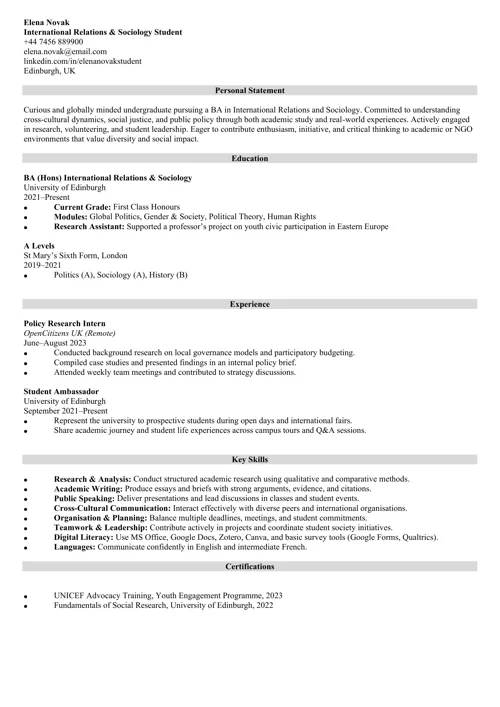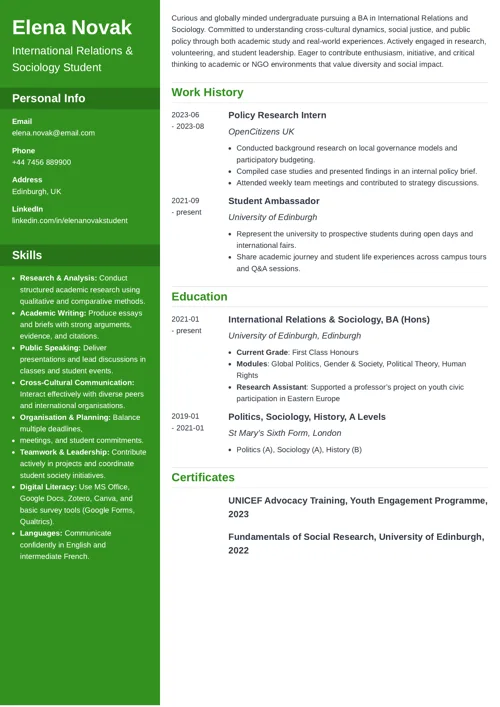200 Words to Describe Yourself: How-to Guide + Tips
Create your CV nowDescribing yourself may seem simple, but it’s one of the trickiest things to do during the recruitment process. You must present a well-told and compelling story that reflects your experience, values, and personality. When done well, your answer builds credibility and sets the tone for the rest of the interview.
Let me show you the best words to describe yourself effectively.
This guide will show you:
- How to describe yourself during the interview, when writing a CV or a cover letter.
- 10 tips on describing yourself well.
- 200 good words to describe yourself.
- 20 words to avoid when creating a personal description.
Want to save time and have your CV ready in 5 minutes? Try our CV builder. It’s fast and easy to use. Plus, you’ll get ready-made content to add with one click. See 20+ CV templates and create your CV here.
Sample CV made with our builder—See more templates and create your CV here.
One of our users, Nikos, had this to say:
[I used] a nice template I found on Zety. My CV is now one page long, not three. With the same stuff.
See our other guides:
- CV Introduction
- What Makes a Good CV: 11 Things Your CV Needs
- Resume vs CV: What’s the Difference?
- What to Include in a CV: Essential CV Sections
- CV Writing Tips and Advice
- Please Find Attached My CV
Why is it important to describe yourself effectively?
Whether you’re speaking to a recruiter, writing a CV or a cover letter, or updating your LinkedIn profile, how you describe yourself shapes how others perceive you. It’s your chance to highlight both your personality and your professional value.
Key reasons why it matters:
- First impressions count. The words you choose to describe yourself create a narrative that sticks with interviewers.
- It shows your self-awareness. Employers want to know that you understand your strengths and how they align with the role.
- You fully control the message. This is your opportunity to define your story before someone else does.
- It demonstrates communication skills. Clear, confident self-expression is often part of the job.
💡Read more: Should You Put Your Photo on Your CV?
When should you describe yourself?
Describing yourself isn't limited to one moment—it can arise at any point during the hiring process. Knowing when to share the right qualities can help you tailor your delivery and remain relevant.
Here’s when positive words to describe yourself can come in handy:
- During the classic interview question, “Tell me about yourself.”
- When answering situational or behavioural questions.
- In your personal summary on a CV or resume.
- On your LinkedIn or professional bio.
- When networking or introducing yourself at industry events.
💡Read more: What Makes a Good CV
Why do interviewers ask you to describe yourself?
Hiring managers aren’t asking this question to hear a list of buzzwords. They want insight into how you think, communicate, and align with their needs. This question helps them assess fit without diving directly into technical skills.
Here’s what interviewers are looking for:
- Confidence without arrogance
- Relevance to the job
- A sense of your soft skills and personality
- Alignment with the team and company culture
- Evidence of reflection and authenticity
💡Read more: Is a Skills-Based CV Right for You?
10 Tips on choosing good words to describe yourself
Describing yourself doesn’t have to feel uncomfortable or forced. Done right, it can be one of your most powerful tools in an interview or professional conversation. The key is finding the balance between authenticity and polish, showing both who you are and how you work.
✅ Here’s how to do it right:
- Tailor your description to the job. Use the job advertisement as your guide.
- Mix personality with skill. Combine who you are with what you do.
- Be specific. “I’m driven” is fine, but “I’m driven by building solutions that simplify processes” is better.
- Use action words. Choose verbs over vague adjectives.
- Support claims with examples. Don’t just say you’re energetic, enthusiastic or confident. Show it.
- Practice, but don’t memorise. Be natural, not robotic.
- Use the STAR (Situation, Task, Action, Result) method. This will help you structure your answer effectively.
- Stay positive. Focus on strengths, not weaknesses.
- Balance humility and confidence. Avoid bragging, but don’t undersell.
- Smile and stay relaxed. Delivery matters just as much as content.
For example, when the recruiter asks to name three words to describe yourself, you can say:
I’m resourceful, creative, and intuitive. As a freelancer, I need resourcefulness to work independently with minimal supervision. Creativity helps me brainstorm new ideas for my graphic design work, and intuition helps me understand the clients’ expectations.
When making a CV in our builder, drag & drop bullet points, skills, and auto-fill the boring stuff. Spell check? Check. Start building a professional CV template here for free.
When you’re done, Zety’s CV builder will score your CV and tell you exactly how to make it better.
200 Words to describe yourself
Words to describe your attitude & mindset
This set of qualities reflects your approach to challenges, change, growth, and high-pressure situations. They are essential for adapting to new environments, embracing learning, and staying motivated over time. These traits are especially valued in performance-driven roles and can significantly influence how employers perceive you.
- Accountable
- Adaptable
- Ambitious
- Balanced
- Committed
- Competitive
- Confident
- Courageous
- Curious
- Driven
- Energetic
- Enthusiastic
- Fearless
- Flexible
- Goal-oriented
- Growth-oriented
- Innovative
- Open-minded
- Optimistic
- Passionate
- Patient
- Persistent
- Positive
- Proactive
- Resourceful
- Resilient
- Results-driven
- Self-motivated
- Self-starting
- Tenacious
Words to describe your personality
These words describe how you interact with others and navigate social and workplace dynamics. Showcasing these traits on your CV demonstrates emotional intelligence, character strength, and integrity. Employers often seek individuals who can foster positive work cultures and enhance team cohesion. Including these descriptors indicates trustworthiness and likability.
31. Altruistic
32. Approachable
33. Calm
34. Caring
35. Charismatic
36. Compassionate
37. Confident
38. Considerate
39. Cooperative
40. Dependable
41. Diplomatic
42. Easygoing
43. Encouraging
44. Empathetic
45. Friendly
46. Gracious
47. Honest
48. Humble
49. Kind
50. Loyal
51. Modest
52. Observant
53. Personable
54. Reliable
55. Respectful
56. Sincere
57. Supportive
58. Sympathetic
59. Tactful
60. Trustworthy
61. Warm
Words to describe professional skills & attributes
This section highlights your practical, work-ready skills and strengths related to organisation, performance, and precision. These qualities reflect your ability to manage tasks, meet deadlines, and deliver high-quality work. They are ideal for structured environments where efficiency, accuracy, and diligence are essential. Including these words helps you present yourself as a dependable and effective professional.
62. Accurate
63. Analytical
64. Capable
65. Deadline-driven
66. Detail-oriented
67. Diligent
68. Efficient
69. Focused
70. Goal-focused
71. Insightful
72. Logical
73. Meticulous
74. Methodical
75. Multi-tasking
76. Organised
77. Performance-minded
78. Practical
79. Precise
80. Process-driven
81. Quality-conscious
82. Responsible
83. Results-oriented
84. Skilled
85. Solution-driven
86. Strategic
87. Structured
88. Task-oriented
89. Thorough
90. Time-conscious
91. Persistent
Words to describe your interpersonal strengths
These qualities highlight your ability to collaborate, communicate, and connect effectively with people at all levels. Whether you’re working in teams, negotiating, mentoring, or supporting customers, strong interpersonal skills are essential. Employers across industries value individuals who foster trust, resolve conflicts, and drive team success. Use these traits to show that you’re a team-oriented, people-first professional.
92. Assertive
93. Cheerful
94. Collaborative
95. Communicative
96. Connector
97. Cooperative
98. Culturally-aware
99. Diplomatic
100. Encouraging
101. Fair
102. Friendly
103. Inclusive
104. Influential
105. Inspiring
106. Listener
107. Mediator
108. Mentor
119. Negotiator
110. Open
111. Outgoing
112. Patient
113. Persuasive
114. Receptive
115. Respectful
116. Social
117. Supportive
118. Team-player
119. Transparent
120. Trust-building
121. Understanding
Words to describe leadership & initiative
This list highlights qualities that demonstrate decision-making skills, strategic vision, and confidence in leading others. Whether you’re managing projects, guiding teams, or driving transformation, these traits showcase your potential as a leader. Displaying them is ideal for progressing upwards and for roles that require ownership, influence, and long-term thinking.
122. Accountable
123. Agile
124. Assertive
125. Challenger
126. Change-agent
127. Coach
128. Coordinator
129. Delegator
130. Decision-maker
131. Developer
132. Direction-setter
133. Dynamic
134. Empowering
135. Ethical
136. Facilitator
137. Futuristic
138. Goal-setter
139. Influencer
140. Leader
141. Mentor
142. Motivator
143. Organizer
144. Pioneer
145. Planner
146. Respected
147. Risk-taker
148. Strategic thinker
149. Trailblazer
150. Transformer
151. Visionary
Words to describe creative & intellectual traits
These qualities highlight your originality, innovation, and cognitive adaptability. They are crucial in problem-solving, designing, inventing, or analysing complex ideas. Using these words shows you can think both profoundly and creatively, a strong combination in modern and evolving fields. They’re especially beneficial for roles in technology, arts, and academia.
152. Adaptive-thinker
153. Analytical
154. Artistic
155. Brainstormer
156. Clever
157. Conceptual
158. Creative
159. Creative-thinker
160. Critical-thinker
161. Curious
162. Design-minded
163. Experimental
164. Fast-learner
165. Futuristic
166. Imaginative
167. Innovative
168. Insightful
169. Inquisitive
170. Intuitive
171. Inventive
172. Logical
173. Observant
174. Open-minded
175. Problem-solver
176. Reflective
177. Synthesizer
178. Systems-thinker
179. Visual-thinker
180. Visionary
Extra words for versatile use
This group includes versatile traits that can give your CV a distinctive edge. Whether you’re describing your work style, industry-specific knowledge, or global awareness, these words help differentiate you in competitive markets. They’re flexible and impactful, which makes them ideal for modern CVs across a wide range of sectors. Use them to highlight your digital fluency, ambition, or customer focus.
181. Big-picture thinker
182. Bilingual
183. Continual-learner
184. Customer-focused
185. Data-driven
186. Design-oriented
187. Detail-obsessed
188. Entrepreneurial
189. Ethical
190. Fast-paced
191. Globally-minded
192. High-achieving
193. Impact-driven
194. Mission-aligned
195. Networked
196. Process-improver
197. Respected
198. Self-aware
199. Service-minded
200. Tech-savvy
💡Read more: Best Fonts for a CV
20 Words to avoid when describing yourself in an interview
Some words, despite sounding positive, are vague, overused, or misleading without evidence. They can also raise red flags or seem insincere.
When selecting the words to describe yourself, avoid generic or hype-driven terms. It’s not only about steering clear of buzzwords, but also about aligning your language with the employer's requirements and presenting an authentic, distinctive view of yourself.
Steer clear of these to keep your message sharp and credible:
1. Awesome – Overused and subjective.
2. Best – Superlative without proof sounds boastful.
3. Cool – Informal and meaningless in a professional setting.
4. Expert – Dangerous unless demonstrably true.
5. Fun – Doesn’t convey skills or value.
6. Genius – Over-the-top and difficult to take seriously.
7. Hard-working – Everyone claims it—show, don’t tell.
8. Honest – Self-proclaimed honesty can backfire.
9. Independent – Can imply resistance to teamwork.
10. Intelligent – Let your work reflect this.
11. Lone wolf – Signals difficulty working in teams.
12. Nice – Generic and unremarkable.
13. Overachiever – Can imply burnout, lack of boundaries, or difficulty with balance/team dynamics.
14. People person – Cliché; be more specific about collaboration.
15. Perfectionist – Can hint at inefficiency or need for control.
16. Synergistic – Jargon with little real meaning.
17. Talented – Subjective and self-congratulatory.
18. Unique – Empty unless you explain how.
19. Visionary – Avoid unless your track record proves it.
20. Wizard – Trendy but unserious (same with “rockstar” or “ninja”).
Plus, a great cover letter that matches your CV will give you an advantage over other candidates. You can write it in our cover letter builder here. Here's what it may look like:
See more cover letter templates and start writing.
Key takeaway
Effectively describing yourself in a professional context is more than just listing strengths. It’s about crafting a compelling, authentic narrative.
📑 Here’s what to remember when you want to stand out with confidence:
- Own your story. Shape how others perceive you by being intentional and authentic in how you describe your personality and skills.
- Adapt to the context. Tailor your self-description based on the scenario—CVs, interviews, bios, and networking moments all require nuance.
- Show, don’t just tell. Back up your traits with specific examples and use action words to keep your message clear and compelling.
- Avoid clichés and fluff. Steer clear of vague buzzwords that lack substance—use precise, meaningful language instead.
- Strike a balance between confidence and humility. Present yourself positively and honestly without coming across as boastful or insincere.
Now you’re 100% ready to characterise yourself, whether it’s on a CV, in a cover letter or during an interview. Revisit this guide whenever you need some words to describe yourself, follow my tips and avoid some dull clichés. Good luck!
About Zety’s Editorial Process
Our editorial team has thoroughly reviewed this article to ensure it follows Zety’s editorial guidelines. Our dedication lies in sharing our expertise and providing you with actionable career advice that offers you real value. Every year, the quality of our content attracts 40 million readers to our site. But that’s not all – we conduct original research to gain a detailed understanding of the labour market. We take pride in being cited by top universities and leading media outlets in the UK and worldwide.







